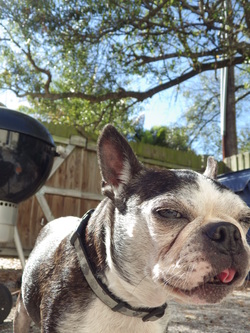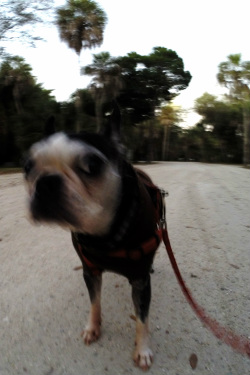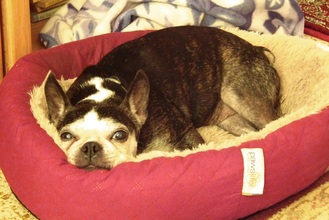 "You'll never guess what that dog got into today," Jeff says. Without waiting for an answer, he continues. "I looked over and it looked like she had a little cigar in her mouth." He pauses for a dramatic moment. "She wouldn't let go of it. I had to pull it out of her mouth." The small dog has very few vices. But her weakness for cat poop is pretty appalling. Like most addictions, there's a familiar cycle: a furtive, all-encompassing obsession, then indulgence and a momentary high. Followed by shame, suffering, and someone else cleaning up the vomit. She knows it's wrong. Or rather, she understands that it's forbidden. But she goes back to the poisoned well over and over. The small dog will snarfle up anything that seems like food. "No human food from human hands" is the rule, but if it's on the floor, it's hers: slivers of cheese, spilled spaghetti. A crunchy slice of fennel once transformed her into Sméagol with her Precious, her Precious! She's like an organic steam-mop, and she's only happy in a new kitchen once she has canvassed every square inch of floor with her nose and tongue.  On her outdoor walking circuit, she has been known to hoover up the chewy carcasses of dried earthworms from the sidewalk, and she'll inhale the crunchy carapaces of shrimps on the sea-wall. Dining on the fly or mindless snacking, it's like an automatic reflex. Catch her quick enough and she'll drop the prize. But cat poop is different. The resident feral cats who live in the neighborhood make full use of the sandy soil wherever the notion takes them. The small dog, pottering around while we garden or work on boats, will slink off to find it. She starts looking guilty as soon as the thought drifts into her mind, but she's sneaky. When caught mid-gulp, instead of dropping it and apologizing, she'll turn and try to swallow her prize whole. Addiction is a terrible thing. This is a dog who usually abhors conflict, and who shivers when scolded. But in the grips of demon poo, she refuses the help of a Higher Power.  She'll come to the door, tardy, smacking her lips with her head lowered. She'll resist making eye-contact. And it's clear how the next three days will play out: first, the bad tummy with all the bells and whistles, with multiple trips outside in the middle of the nights, the little dog listless and unhappy, her humans disgusted. Other times, I'm taken unawares. She'll seem pokey on a walk. There will be a rather pathetic series of minor yarks. She'll resist play. I'll be reminded of her inevitable mortality, of how the vet told me she is on borrowed time. I'll say to Jeff, "She IS an old dog." He'll look at her, as she huddles in her bed with her eyes the only part moving. He'll make a dismissive sound at the same time he stoops to rub her forehead. "Eh, she'll be fine. She's been eating cat poop again."
4 Comments
Mandy
3/25/2014 01:17:30 am
Goose poop is coveted by the dog in our house! Doesn't seem to upset the system like cat poop.
Reply
Amy
3/25/2014 01:21:53 am
Eeeew.
Reply
Matt Dalton
3/25/2014 01:27:49 am
Think of how happy you could make her life if you actually got a cat. Her own cat to follow around.....Wow. I cannot believe you are withholding this from her. Lol. Go cat shopping and make the little doggy happy,
Reply
Amy
3/25/2014 06:24:08 am
Oh Matt!
Reply
Leave a Reply. |
About the Blog
A lot of ground gets covered on this blog -- from sailboat racing to book suggestions to plain old piffle. FollowTrying to keep track? Follow me on Facebook or Twitter or if you use an aggregator, click the RSS option below.
Old school? Sign up for the newsletter and I'll shoot you a short e-mail when there's something new.
Archives
June 2024
Categories
All
|
 RSS Feed
RSS Feed
